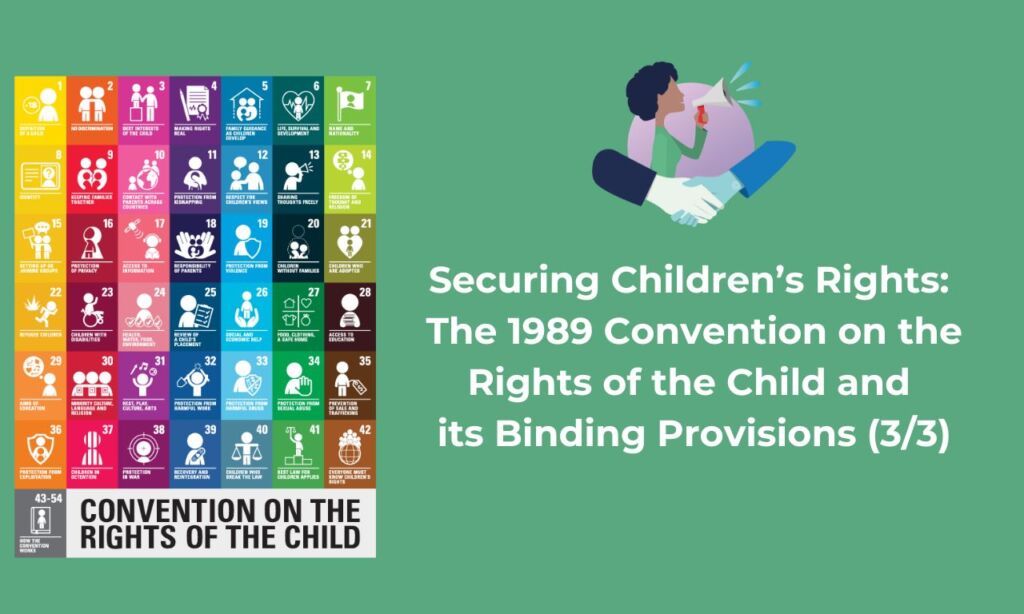
Securing Children’s Rights: The 1989 Convention on the Rights of the Child and its Binding Provisions (3/3)
- Written by: Apolline Foedit, PhD student in International History, the Graduate Institute, Geneva
- Pioneer advocacy
As we have seen in two previous articles, the evolution of children’s rights has been marked by significant milestones, each reflecting a collective commitment to uphold the dignity and freedom of individuals worldwide. Building upon earlier declarations, the adoption of the United Nations Convention on the Rights of the Child (CRC) in 1989 represented a turning point in the protection of children. Contrasting with the 1924 and 1959 Declarations, the 1989 CRC addressed the specific needs and rights of children in a comprehensive and legally binding manner.
The 1924 Declaration set forth foundational principles affirming the rights of children, emphasizing their entitlement to special care and protection. However, it lacked the binding legal mechanisms necessary for enforcement, rendering its impact largely declarative. Similarly, the 1959 Declaration expanded upon the rights outlined in 1924, emphasizing the importance of education, healthcare, and opportunities for children to develop to their fullest potential. Yet, like its predecessor, it lacked the enforceability required to hold nations accountable for violations of children’s rights.
In contrast, the 1989 CRC represented a paradigm shift in the protection of children’s rights by establishing a comprehensive framework with legally binding provisions. Unlike the earlier declarations, the CRC defines a child as any individual under the age of eighteen and articulates a wide range of civil, political, economic, social, health, and cultural rights tailored to address the specific vulnerabilities and needs of children. The Declaration is also much longer than its predecessors; it is composed of 54 articles. From protection against exploitation to access to education and healthcare, the CRC outlines fundamental rights that every child is entitled to, regardless of nationality, ethnicity, or socio-economic background.
According to article 3, “In all actions concerning children, whether undertaken by public or private social welfare institutions, courts of law, administrative authorities or legislative bodies, the best interests of the child shall be a primary consideration”. This aligns with ISS principles, aiming to resolve legal conflicts arising from the child’s rights, such as protection versus privacy, or conflicting with third-party rights, like parental authority. ISS emphasises an approach prioritising the best interest of the child by notably using a participative approach in decision-making, acknowledging their wellbeing as foundational.
Furthermore, the CRC established mechanisms for monitoring and enforcing its provisions, including the creation of the UN Committee on the Rights of the Child (UNCRC). This committee is responsible for overseeing the implementation of the convention by member states, ensuring compliance with international law and standards. States that ratified the convention are obliged to submit periodic reports and respond to inquiries regarding the status of child rights within their jurisdictions. Additionally, the UNCRC introduced optional protocols aimed at addressing specific issues such as child soldiers and the sale of children, further enhancing its efficacy and relevance in addressing contemporary challenges.
As of January 2024, the CRC has been ratified by 196 countries, making it one of the most widely accepted human rights treaties in history. Its enforceable provisions and comprehensive approach to protecting children’s rights distinguish it from earlier declarations, marking a significant step forward in the global effort to promote justice, equality, and dignity for all individuals, especially the most vulnerable members of society. However, as argued by many, the rights of the child are not yet exemplary today: violations still occur, and the work is not finished !
There are many books, publications and brochures about children’s rights!
You can check the publication from the Council of Europe, where you can learn more about the concept of the best interests of the child or European law regarding the rights of the child.
You can learn about the timeline of child rights on the UNICEF website.